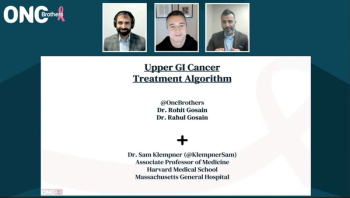
Dr Klempner and the Oncology Brothers discuss the treatment paradigm for patients with metastatic upper GI cancers.

Your AI-Trained Oncology Knowledge Connection!


Dr Klempner and the Oncology Brothers discuss the treatment paradigm for patients with metastatic upper GI cancers.

The Oncology Brothers and Sam Klempner, MD, offer comprehensive insights on treating residual disease in upper GI cancers following FLOT treatment.

Sam Klempner, MD, joins Rahul Gosain, MD, and Rohit Gosain, MD, to discuss treatment strategies for esophageal, GE junction, and gastric cancers.
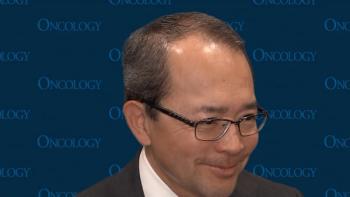
The use of proton therapy may offer a more specific depth charge compared with conventional radiation, according to Timothy Chen, MD.

ZAP-X may provide submillimeter accuracy when administering radiation to patients with brain tumors.
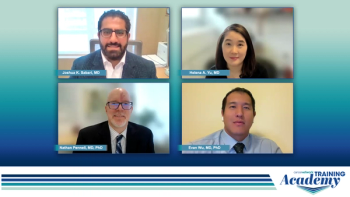
The discussion on biomarker testing practices for patients with non–small cell lung cancer turns its focus to the metastatic setting.

A panel of medical oncologists introduce themselves and provide clinical insights on biomarker testing practices for patients with non–small cell lung cancer.

The expert panel provides closing remarks on exciting developments in the evolving treatment landscape in multiple myeloma.
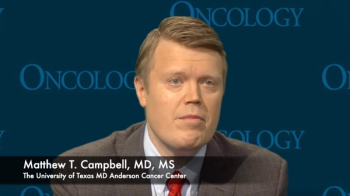
Molecular profiling is a tool that can best determine first-line therapy options for patients with advanced RCC.
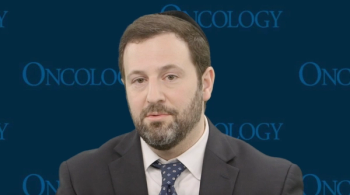
Clinicians are learning how to identify adverse effects relating to either immunotherapy or tyrosine kinase inhibitors for patients with advanced renal cell carcinoma.

Moshe Ornstein, MD, discusses the heterogeneous population that comprise patients with advanced renal cell carcinoma.

Tiffany Richards, PhD, ANP-BC, and the rest of the panel offer clinical advice on the care of patients with multiple myeloma who are receiving talquetamab.

Beth Faiman, PhD, MSN, describes the role of a GRPC5D-targeting bispecific antibody, talquetamab, in the treatment of patients with relapsed/refractory multiple myeloma.
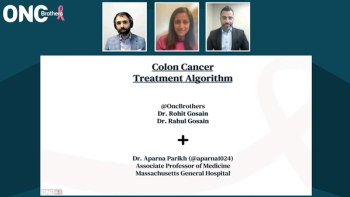
Aparna Parikh, MD, and the Oncology Brothers have a comprehensive discussion on treatment decision-making practices for patients with colon cancer, highlighting considerations such as high microsatellite instability and refractory disease.

Medical oncologists give an overview of the treatment algorithm for metastatic colon cancer.

The Oncology Brothers and Aparna Parikh, MD, review the treatment algorithm for patients with stage III colon cancer.

Dr Parikh provides insights on the role of circulating tumor DNA in the treatment of patients with colon cancer.

Aparna Parikh, MD, joins Rahul Gosain, MD, and Rohit Gosain, MD, to discuss the treatment of patients with localized colon cancer, primarily focusing on stage II disease.
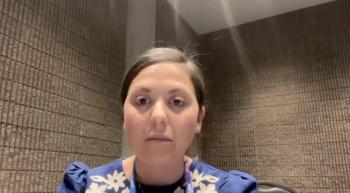
Tailoring neoadjuvant therapy regimens for patients with mismatch repair deficient gastroesophageal cancer represents a future step in terms of research.

Not much is currently known about the factors that may predict pathologic responses to neoadjuvant immunotherapy in this population, says Adrienne Bruce Shannon, MD.

The toxicity profile of tislelizumab also appears to look better compared with chemotherapy in metastatic esophageal squamous cell carcinoma.

Patients with unresectable or metastatic esophageal squamous cell carcinoma and higher PD-L1 expression may benefit from treatment with tislelizumab, according to Syma Iqbal, MD.

Quantifying disease volume to help identify potential recurrence following surgery may be a helpful advance, according to Sean Dineen, MD.

Sean Dineen, MD, highlights the removal of abdominal wall lesions and other surgical strategies that may help manage symptoms in patients with cancer.

Comprehensive insights on the management of toxicities seen in patients with multiple myeloma who are receiving talquetamab.

The expert panel concludes its discussion with a focus on the future of MRD testing in colorectal cancer, highlighting the treatment landscape’s current strengths and challenges.

Expert perspectives on educating patients with multiple myeloma on adverse effects related to treatment with talquetamab.
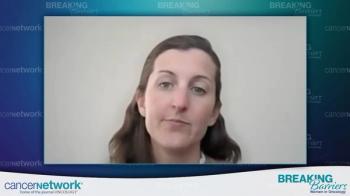
Two women in genitourinary oncology discuss their experiences with figuring out when to begin a family and how to prioritize both work and children.
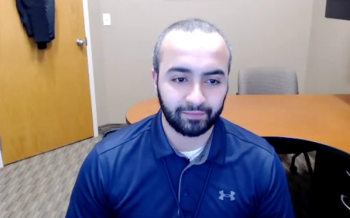
Oncology pharmacists are important to the oncology care team, as they can bring a unique perspective to treatment planning, according to Kirollos S. Hanna, PharmD, BCPS, BCOP, FACC.
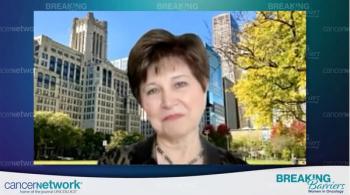
Over the past few decades, the prostate cancer space has evolved with increased funding for clinical trial creation and enrollment.